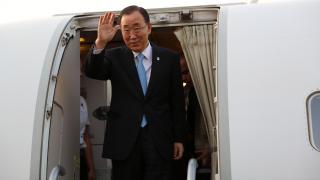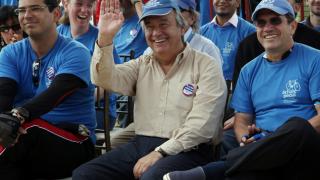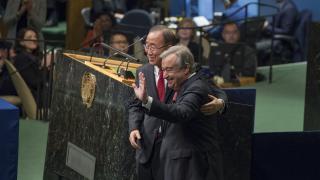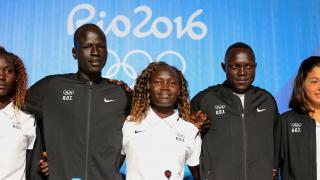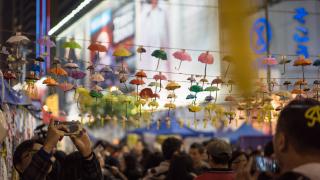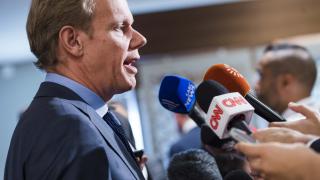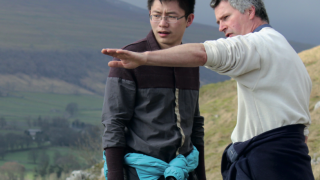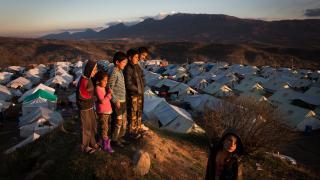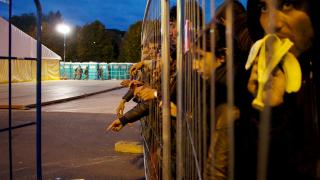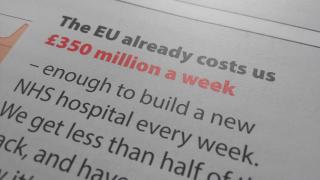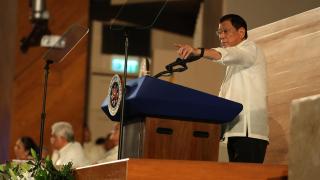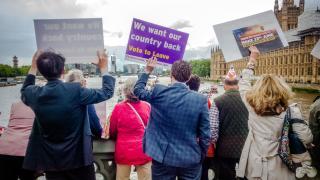
Internationalism
Owen Jones is a columnist and the author of Chavs: The Demonization of the Working Class
‘Post-truth politics’ is a term that needs scrutiny. Sometimes it seems to express the bewilderment of those on the losing side of politics, who don’t examine their own failures and instead blame mass delusion on the part of the great unwashed. But there is no question that prejudices and myths are being zealously exploited by powerful politicians and media moguls – and that this poses a threat to the entire international order.
In the aftermath of the financial crash – just as after the Wall Street Crash – politics across the West has polarised. We are, thankfully, not confronted (yet) by the full horror of totalitarian fascism. Instead, we are experiencing 1930s-lite: the rise of populist, xenophobic movements with an authoritarian bent, from Hungary to the US, from Poland to Britain. The danger is a world dominated by competing aggressive nationalisms – all exploiting prejudices and myths that are useful in shoring up domestic support but destabilising on the global stage.
Social media has allowed for the democratisation of news. But it has also facilitated the proliferation of fake content: Facebook is awash with stories with no factual basis. Many of the new nationalist movements have benefited from this phenomenon. Whether it’s Donald Trump blaming Mexican immigrants or Muslims for the multiple problems facing US society, or Brexit rhetoric that amounts to shaking fists at the rest of the world, the trend is undoubtedly towards retreating inwards. Those who call for more global co-operation are dismissed as liberal elitists, weak and unpatriotic. Those who believe in peace, or international action to deal with tax avoidance and climate change, have a fight on their hands – but the future of humanity depends on our success.
The United Nations
Michael Møller is Director-General of the United Nations Office at Geneva
The refugee and migrant crisis, the horrific conflict in Syria and the threat of terrorism are all things we hear about on a daily basis through the media. At the same time, within the international development community, hot topics being discussed also include gender equality, the Sustainable Development Goals and innovation. Sadly, they are not making the headlines.
We are not getting the full picture. Dedicated civil servants in UN agencies are working harder than ever to help the world’s most vulnerable people, with a heavier caseload, dwindling resources and in increasingly difficult circumstances. Many of those on the frontline are becoming targets of violence themselves. Paradoxically, media coverage of their work generally highlights the perpetuity of these crises, feeding perceptions that solutions are nowhere in sight. Consequently, the UN and its partners are connected to these pessimistic stories in people’s minds, creating a negative perception of the Organisation.
This is why the UN Office in Geneva launched the Perception Change Project. The goal is to show the relevance and impact of the work collectively done by Geneva’s unique concentration of institutions, knowledge and resources. Together, they form an ecosystem around international development and humanitarian action, as well as health, trade, human rights, telecommunications, intellectual property, labour rights, disarmament and migration. It includes the UN, other international organisations, over 400 NGOs, think tanks, academia and businesses. Geneva is to international development what Silicon Valley is to internet start-ups. It is the global operational hub for international action – and the world needs to know about it.
Diplomacy
Isabelle Younane is Campaigns and Communications Officer at UNA-UK
Zeid Ra’ad Al Hussein stunned his audience into silence at The Hague this September when he branded Geert Wilders and “his acolytes” as “demagogues”, who appeal to fear and prejudice as a means of winning power. In a subsequent speech at the UN Summit for Refugees and Migrants, Zeid again spoke “the bitter truth” to an audience perhaps not used to hearing it, criticising those who oppose greater shared responsibility for victims of forced migration.
The latter speech had, at the time of writing, received 94,383 views on Facebook, suggesting that ‘truth’ – honest opinion – is not a frequent caller at Turtle Bay. Diplomacy and deal-making are the modi operandi, as states are intensely aware of the political costs of falling out with their allies.
This is a necessary evil. The rules-based international order depends on states abiding by self-imposed laws – from upholding human rights to respecting state sovereignty. Freezing out a state because it fails to comply with a certain provision of international law could result in a UN that is reserved for the obedient few. This would be damaging for the UN’s legitimacy and universality.
However, a balance must be struck. In the run-up to the appointment of a new Secretary-General, UNA-UK asked its supporters which quality they felt was most important in the next UN chief. Top of the list was “speak truth to power”, suggesting that in order to serve “we the peoples”, the UN must reconcile its reliance on co-operation with its duty to hold states to account. With a new Secretary-General who has been an outspoken advocate for the vulnerable, there’s reason to hope that others will follow Zeid’s lead.
Media
Emma Briant is a Lecturer in Journalism Studies at the University of Sheffield and co-author of Bad News for Refugees
The far right has become emboldened. This year, we have seen coverage of refugees and migrants – already extremely negative – stoop to new lows amid the hateful rhetoric and misinformation during the Brexit media campaign. With the executive chairman of the so-called ‘alt-right’ website Breitbart News now in the White House as Donald Trump’s chief strategist, extreme narratives are likely to gain even greater power and legitimacy.
Hateful propaganda has led many to question whether we have suddenly plunged into a ‘post-truth’ world. Sadly, this overlooks the reality that fact-free news, selective and misleading coverage, and fearmongering are not new. We have already seen its dangerous consequences: the increase in hate crimes in the UK since the EU referendum and Nazi graffiti in the US following Trump’s election.
It is therefore vital that the media also tell stories of generosity and compassion, and highlight the positive narrative of successful refugee journeys and how they contribute to the communities that host them. Reporting of integration difficulties should be accompanied by integration successes, and questions to policy-makers on how to replicate them.
Social media campaigns can force mainstream outlets to cover absent issues (see #SomeoneTellCNN and #LetAymanReport). But these platforms have also been exploited. Marine Le Pen was quick to cheer Trump’s victory on Twitter, and the press quick to report on it, inflating her voice. She was then given a platform to speak on the BBC’s Andrew Marr Show on Remembrance Sunday. The normalisation of marginal and extreme views becoming all too familiar. We urgently need to campaign for more balanced coverage or extremists will hijack the debate.
Polling
Professor Sir Robert Worcester KBE DL is the founder of MORI, a leading polling, public affairs and research company
If you go to the races, your eyes tell you which horse is ahead, which is behind, and which is likely to win. During elections, the polls are your eyes at the track. After Trump’s victory in the US and Brexit in the UK, many are asking: how could the polls get it so wrong? Answer: they didn’t. If two voters in a hundred in the swing states of Pennsylvania, Florida and Michigan had voted for Clinton, not Trump, she’d be President-elect. Again, two voters in a hundred voting ‘stay’, not ‘leave’, and Brexit would be dead. Both elections were that close.
Properly conducted public opinion polls are systematic and objective. It is when they get into the hands of spin doctors, and poll-naive journalists and pundits who have their own axes to grind, that they become a threat to democracy.
I’m sometimes asked if polls are “rigged” and I say “not if the polling organisation wants to stay in business”. Pollsters have every incentive to get it right. The tools that they have to assess the state of the nation are limited by the laws of statistics, yet media expectations (and therefore people’s expectations) are that they are gospel, but if proved fallible, useless. Polls depend on what people say, and – despite the much-discussed phenomenon of ‘shy’ Trumpists or Brexiteers – most people tell the truth.
Provided the polls model the universe accurately, draw a representative sample, reach the randomly selected people in the sample and ask the right questions, aggregate their answers accurately, and report their collective responses with objectivity, polls can tell you what the public are thinking. If the answers are worrying, it’s not the pollsters who are to blame.
Climate change
George Marshall is the co-founder of Climate Outreach and the author of Don’t Even Think About It: Why Our Brains Are Wired to Ignore Climate Change
This is the ultimate post-truth issue. There is no other on which people’s attitudes diverge so strongly from the underlying scientific evidence, and which is more starkly divided along political lines, enabling many intelligent conservatives to deny the overwhelming evidence.
Maybe, as some cognitive psychologists suggest, climate change feels so inherently distant in time and place that it lends itself to this kind of bias. But my research has led me to argue that the problem lies with the cultural narratives that liberal environmentalists (like myself) have projected. We have done such a good job of championing climate change that we have shaped it in our own image, so people who do not share our world view find it very easy to ignore or reject.
At Climate Outreach, the communications organisation I co-founded 10 years ago, we are dedicated to speaking to new audiences, including political conservatives and people of faith. We are convinced there are many fresh ways to energise people by appealing to their own values.
Article 6 of the UN Framework Convention on Climate Change calls upon governments to “educate” the general public. They have failed to fulfil this commitment. Future social, and with it political, action can only come through broad-based public engagement. But this cannot be achieved through purely scientific education. Although evidence and data are a critical foundation for action, ultimately we only become motivated by a sense of our shared identity. Empowering and compelling narratives can only come from seeing climate change as an issue that binds us together: through our national and cultural pride, concern for our families and communities, and a sense of shared humanity.
International development
Simon Moss is a co-founder of Global Citizen and currently its Managing Director of Campaigns
Extreme poverty rates have plummeted, more kids are getting a quality education and clean water is reaching almost all people. We’re on the brink of eradicating guinea worm and polio, and child deaths have more than halved in the last generation.
But, in much of the world, that positive picture doesn’t match how we feel. This dissonance between fact and feeling is nothing new in global development circles. For those of us brought up on a steady diet of ‘flies in their eyes’ fundraising ads, benefit concerts and telethons, the idea that things are getting worse has strong emotional resonance.
In the development community, we’ve spent much of the last five years seeking to address this. Comic Relief has sought to make us cry with happiness, not sadness. Bill Gates has gone to parliaments with his Living Proof campaign that demonstrates the progress we’ve made. And at Global Citizen, we’ve inverted the benefit gig by giving tickets away to those who take actions that lead to real commitments. Our recent show in London helped unlock an additional £100m in UK aid for girls’ education.
When shaping public debate, it’s never been just about facts. And now more than ever, feelings come first. If we continue to sell a story of dire need, the public will conclude that development doesn’t work. Not everyone is interested in the detail of development policy, but most people care a lot about whether they feel proud of their country, and whether their efforts make a difference. And that’s our challenge now – to take our collective facts, and link them back to the feelings that have always driven politics.
Photo: A photograph of 2016 US presidential candidate Donald J. Trump illuminated with flood lights in a suburban backyard near Jordan Creek Parkway and Cody Drive in West Des Moines, Iowa. Credit Tony Webster/CC



